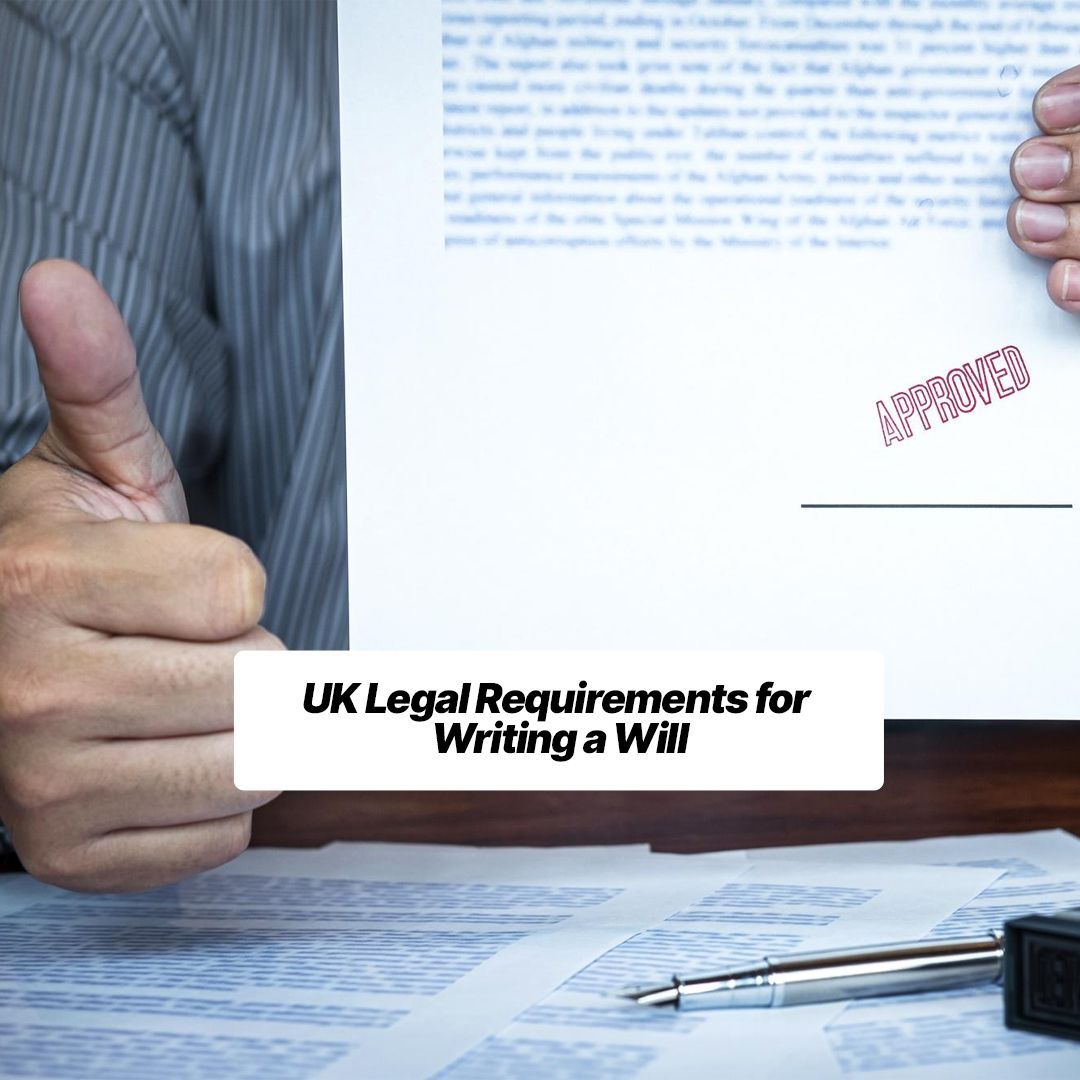Everything You Need To Know About Will-Writing Services In the UK
Everything You Need To Know About Will-Writing Services In the UK

Writing a will is one of those things many people do, often thinking there’s still time or that it’s only for later in life. Yet when the unexpected happens, not having a will can leave families facing stress, conflict, and financial uncertainty. That’s why getting a trusted and right will-writing services in the UK is essential.
In this guide, we’ll walk you through why writing a will matters more than people realise, what steps are involved in writing one, and how you can make sure it is legally right. We’ll also look at the different ways to get a will written and show you which option gives you the best protection. Think of it as a straightforward, expert-led walkthrough designed to clear away the confusion and give you practical answers you can trust
Why Having a Will is So Important
Many people underestimate the value of having a will until they face any consequences. A will is not just a random piece of paper; it is an important document that protects your assets and spares your family from unnecessary stress when you are no longer there. Without one, the law takes over, and that often creates results families do not expect.
What Happens Without a Will
If you pass away without a will in the UK, the rules of intestacy decide how your estate is divided. This can lead to:
- Delays in accessing money or property.
- Unwanted distribution of assets.
Family disputes due to disagreements.
The Benefits of Having a Will
- You can split your estate as you choose.
- Financial provision is secured for dependents.
- Stress and conflict for loved ones are reduced.
- Executors can act quickly, saving time and legal costs.
By having a will in place, you give your family certainty at a time when clarity matters most. Now that you understand why a will is essential, let’s move on to the practical steps of writing one
The Nitty-Gritty of Writing a Will

Writing a will becomes much easier when you break it into simple, practical steps. Each stage matters because it reduces confusion later and keeps your wishes clear. Here are some simple steps involved in writing a will:
Step 1: List All Your Assets
Start by writing down everything you own from your home, savings, investments, pensions, and personal valuables. Having a complete and clear list avoids missed items and ensures nothing is overlooked.
Step 2: Decide on Your Beneficiaries
You must consider who you wish to have benefited from your will. These individuals are referred to as your beneficiaries. Your assets may be bequeathed to charities, friends, or family. You have complete control over it.
Step 3: Choose an Executor
An executor manages your estate after you pass away. Appointing a solicitor as someone who provides will-writing services is the safest choice, as they bring legal knowledge and impartiality. Although you can also choose friends or family, hiring a
legal aid solicitor will be the best course of action from an expert's perspective.
Step 4: Divide Your Assets Fairly
Think carefully about how to split your estate. Fair and transparent decisions reduce the risk of disputes and make the process smoother for your loved ones.
By following these steps, you create a will that works in practice, not just on paper. Next, let’s look at the legal requirements in the UK that make a will valid.
UK Legal Requirements for Writing a Will

A will only holds value if it meets the legal rules. Missing even one requirement can make the entire document invalid, which may leave your estate in dispute. Let’s break it down simply.
A will must be a written document to be legally valid.- The person making the will, known as the testator, must sign it at the end.
- You need two witnesses over the age of 18 at the time of signing.
- If a witness is also named as a beneficiary, their inheritance becomes invalid. Always choose independent witnesses who do not benefit from your estate.
Following the legal rules gives your will a strong foundation, but many people still find the process overwhelming. That’s where professional help comes in. In the UK, you can choose from different will-writing services depending on your needs, budget, and the complexity of your estate. Let’s explore the main options available and how each one works
Types of Will-Writing Services Available
Choosing how to write your will matters just as much as the content itself. In the UK, several options are available, each with its own benefits and limitations. Understanding these choices helps you make a decision that matches your situation and avoids problems later

1. Solicitors
Solicitors remain the most secure choice for
will-writing services. They are legally trained, regulated, and ensure your will meets all formal requirements. If your estate is complex, includes property abroad, or involves inheritance tax planning, a solicitor is the safest option.
For example, if you are planning for the future and extending your family, a
family law solicitor can guide you on what changes should be made to your will and how to do them correctly. This level of tailored advice ensures your wishes remain valid as your life circumstances evolve.
Pros:
- Legally binding and regulated service.
- Expert advice on complex estates.
- Reduces the risk of disputes.
2. Professional Will Writers
Professional will writers are often affordable. However, the sector is less regulated, so the quality of service can vary. Many people choose this route to save money, but it’s important to check credentials and membership with recognised bodies.
Pros:
- Lower cost.
- Useful for straightforward estates.
- Can offer home visits or flexible service.
3. Online Will-Writing Services
Online platforms allow you to draft a will quickly from the comfort of your home. They are convenient, accessible, and often cheaper than professional services. However, they may not provide tailored advice, which can lead to issues if your estate has complications.
Pros:
- Affordable and easy to access.
- Quick process with step-by-step templates.
- Suitable for very simple estates.
4. Charity or Bank Schemes
Some charities and banks offer free or discounted will-writing schemes. These will-writing services can be helpful if cost is the main concern, but they often come with a limited scope and may encourage donations to the charity.
Pros:
- Low-cost or free option.
- Good for people with straightforward wishes.
- Encourages support for charitable causes.
Key Consideration
Many people choose cheaper options to cut costs, but they often face difficulties later, either their will is challenged, or it fails to reflect their true wishes. For peace of mind, it’s best to balance affordability with security.
Now that you know the main options, the next step is understanding why Foster Legal Solicitor is the best will-writing service in the UK
The Best Will Writing Service in the UK – Foster Legal

When it comes to writing a will, choosing the right service makes all the difference. Foster Legal stands out as a trusted and regulated choice, offering clients the reassurance that their wishes will be properly documented and legally protected.
Regulated and Trusted Experts
Foster Legal operates with full regulation and professional standards, ensuring every will is valid and enforceable. Clients know their documents are handled with precision and care, reducing the risk of future disputes.
Local Presence in Key Areas
With offices in
Stevenage, Peterborough, and Watford, Foster Legal is within reach for clients who value local expertise. This presence allows face-to-face discussions and personalised guidance rather than a one-size-fits-all approach.
Tailored Wills for Peace of Mind
Every family has unique needs. Foster Legal creates wills that reflect individual circumstances, from dividing property to safeguarding children’s interests. For example, if you already have a will but your family situation changes, such as welcoming a new child, a family law solicitor can advise you on what updates to make and how to implement them. Similarly, if child custody arrangements need to be considered, a
child custody solicitor can guide you on how to include these provisions in your will, ensuring clarity and protection for your children. This tailored service helps families avoid uncertainty and secures their future with confidence.
Preventing Disputes and Protecting Families
Disagreements often arise when wills are unclear or incomplete. By working with Foster Legal, clients receive a clear and binding document that leaves no room for confusion. This proactive step protects loved ones and provides lasting peace of mind.
Why Choose Foster Legal:
- Fully regulated and compliant services.
- Experienced solicitors with expertise in sensitive family matters.
- Local offices in Stevenage, Peterborough, and Watford.
- Tailored solutions for both simple and complex estates.
- Reliable support to avoid disputes and ensure smooth execution.
Understanding who to trust with your will is crucial, but it’s just as important to act without delay. In the final section, let’s look at important tips you should consider
Important Tips for Will Writing

Writing a will is only the first step. To make it effective, you need to manage it carefully and avoid common mistakes.
- Keep the original will in a secure place, such as with your solicitor, at home in a fireproof box, or with your bank.
- Revisit your will after key events like marriage, divorce, or the birth of children.
- If you need to make changes, use a codicil prepared correctly.
- Be aware of tax implications and explore trusts or exemptions that may reduce the tax burden on your estate.
- If your estate involves business assets, overseas property, or blended families, professional advice is essential. Solicitors can tailor solutions that prevent costly mistakes.
- Discuss your will with family to avoid surprises later.
A properly drafted will saves money and stress in the long run. By getting it correct from the outset, you protect your assets and give your family financial security.
Conclusion
Writing a will is not just a formality; it is one of the most valuable steps you can take to protect your family’s future. In this guide, we have looked at why having a will matters, the legal requirements in the UK, the different will-writing services available, and the practical tips that make the process smoother. Each part plays an important role in ensuring your wishes are clear and legally secure.
A will brings peace of mind and removes uncertainty for your loved ones. Instead of leaving the law to decide, you take control of how your estate is managed. This clarity prevents disputes, reduces stress, and makes sure your assets go exactly where you want them to.
Don’t leave it to chance, take control today with
Foster Legal, your trusted partner in will writing in the UK. With our experience and local presence in Stevenage, Peterborough, and Watford, we make the process clear, legally binding, and tailored to your needs.
Ready to secure your family’s future? Speak to Foster Legal today and let us help you put your wishes in writing with confidence
Frequently Asked Questions
What you should know before you purchase a will writing service?
You should know whether the service is regulated, legally binding, and suitable for your needs. Always check who is drafting your will and whether they can guide you through complex matters like tax or child arrangements
What is the biggest mistake with Wills?
The biggest mistake is writing a will without professional advice, which often leads to invalid documents or disputes. Simple errors in signing or unclear wording can cause serious problems later
How does a writing service work?
A will writing service helps you record your wishes, decide beneficiaries, and appoint executors. Depending on the service, this can be done face-to-face with a solicitor, through regulated will writers, or via online platforms
What is the average cost of writing a will in the UK?
On average, a basic will costs between £100 and £300 in the UK. The price varies depending on whether you use a solicitor, an online service, or specialist advice for complex estates
What should you never put in a will?
You should never include joint assets, funeral wishes, or anything illegal in a will. These matters are handled differently and should be dealt with through other legal or personal arrangements












